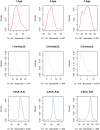The combined impact of social networks and connectedness on anxiety, stress, and depression during COVID-19 quarantine: a retrospective observational study
- PMID: 38169600
- PMCID: PMC10758457
- DOI: 10.3389/fpubh.2023.1298693
The combined impact of social networks and connectedness on anxiety, stress, and depression during COVID-19 quarantine: a retrospective observational study
Abstract
Introduction: The COVID-19 pandemic and associated quarantine measures have precipitated a surge in mental health disorders, particularly depression and anxiety. Government policies and restrictions on physical activity have contributed to this phenomenon, as well as diminished subjective social connectedness and exacerbated objective social isolation. As two dimensions of social isolation, it is worth noting that subjectively perceived social connectedness serves as a protective factor for mental health, whereas the decline in the size of objectively evaluated social networks poses a significant risk. However, research investigating the combined influence of these two dimensions remains limited.
Methods: This study used an online survey to collect data to investigate the effects of objective social connectedness and objective social networks on anxiety, stress, and depression during COVID-19 quarantine. A total of 485 participants were analyzed using statistical methods, including paired t-test, Pearson correlation analysis, linear regression, cluster analysis, ANOVA, and moderated mediated.
Results: The study found that anxiety and depression scores increased during the quarantine, with age, education, and social connectedness scores associated with the increase. Pre-quarantine anxiety and depression levels were strongly correlated with mental health status during quarantine. Cluster analysis, respectively, revealed three clusters for those without increasing anxiety and depression scores. The study also found that objective social network influences the impact of subjective social connectedness on pre-quarantine mental health, which in turn affects anxiety and depression levels during quarantine.
Conclusion: The study identified that quarantine increased anxiety and depression, with age being protective, and education and subjective social connectedness as risk factors. The study also emphasizes the comprehensive impact of objective and subjective social isolation. Although individuals perceive the same degree of social connectedness, those with smaller social networks are more prone to developing symptoms of anxiety and depression, which are also more likely to worsen during quarantine.
Keywords: COVID-19; anxiety; depression; moderated mediation; social connectedness; social isolation.
Copyright © 2023 Luo, Luo, Tang, Niu, Xu and Li.
Conflict of interest statement
The authors declare that the research was conducted in the absence of any commercial or financial relationships that could be construed as a potential conflict of interest.
Figures






References
-
- Stein C, Cousin E, Machado ÍE, Felisbino-Mendes MS, Passos VMA, Sousa TM, et al. The COVID-19 pandemic in Brazil: Institute for Health Metrics and Evaluation projections and observed evolution, 2020. Epidemiologia e Serviços de Saúde. (2021) 30:30. doi: 10.1590/s1679-49742021000100017 - DOI - PubMed
-
- Santomauro DF, Herrera AMM, Shadid J, Zheng P, Ashbaugh C, Pigott DM, et al. Global prevalence and burden of depressive and anxiety disorders in 204 countries and territories in 2020 due to the COVID-19 pandemic. Lancet. (2021) 398:1700–12. doi: 10.1016/S0140-6736(21)02143-7, PMID: - DOI - PMC - PubMed
Publication types
MeSH terms
LinkOut - more resources
Full Text Sources
Medical
Research Materials

